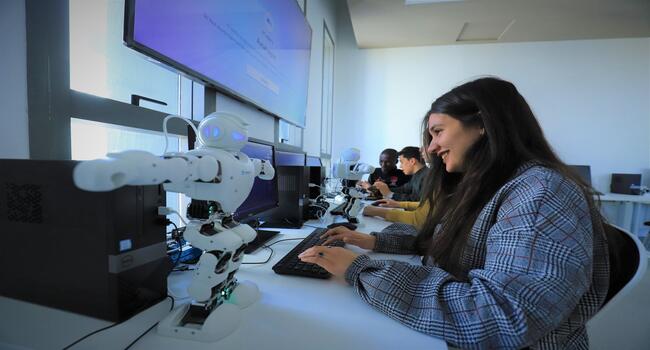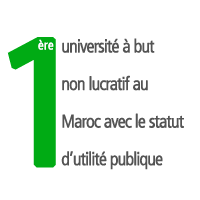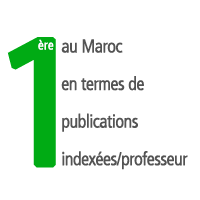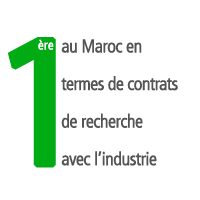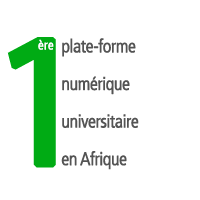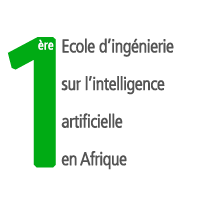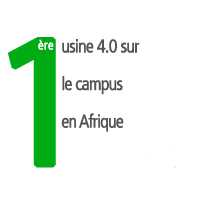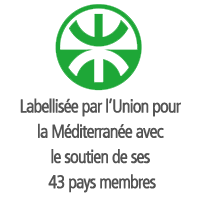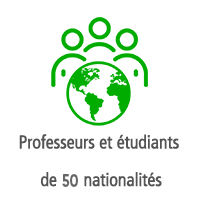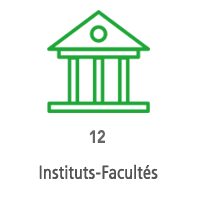Entrepreneurial Support and Technological Management
Master

Diploma awarded
: Master “Entrepreneurial Support and Technological Management”Duration of studies
: 2 yearsCoordinator
: Pr. Othmane BENMOUSSAThe training, provided by the Euromed Polytechnic School, in partnership with the Mohammed V Foundation for Solidarity , is broken down into modules favoring an umbrella line of action around entrepreneurship and innovation in all its forms (incremental innovation , market, technological, radical, “inside the box”, “outside the box” and “around the box”).
Students learn to manage product or service innovation projects from the idea to their marketing, but above all help entrepreneurial structures, at all levels, to innovate in a logic of robust profitability allowing them to impose itself sustainably against competitors
The modules offered include lessons grouped according to the training objectives pursued per semester.
Semesters 1 and 2:
The first two semesters of the Master aim to provide transversal knowledge of business issues necessary before any in-depth study. They relate to general lessons aimed at consolidating previous acquisitions and their application to SMEs.
They are intended to provide students with a base of skills on which the lessons of the second year will be based.
They allow you to:
- acquire the transversal knowledge and skills necessary for the development and creation of economic organizations;
- acquire a global vision, both strategic and functional, with a view to building the skills necessary to carry out management functions.
|
SEMESTER 1 |
|
Module 1: ecosystem of organizations |
|
Work and organizations |
|
Management of organizations |
|
Module 2: legal management |
|
Corporate law |
|
Company tax management |
|
Module 3: human resources development |
|
Sociology |
|
human resources management |
|
Module 4: accounting and financial management |
|
Accounting and budgets |
|
business Finance |
|
Module 5: marketing management |
|
Marketing analysis and operational marketing |
|
Digital Marketing |
|
Module 6: leadership and management |
|
Leadership, psychology and management styles |
|
Managerial practices |
|
Module 7: quantitative techniques I |
|
Probability and statistics |
|
Introduction to operations research and forecasting analysis |
|
Module 8: English and Euromed culture I |
|
English |
|
Euromed culture |
|
SEMESTER 2 |
|
Module 9: Quantitative Techniques II |
|
Applied probabilities and stochastic processes |
|
Introduction to the Python programming language |
|
Module 10: entrepreneurship |
|
Entrepreneurship and business strategy |
|
Social and solidarity entrepreneurship |
|
Module 11: innovation |
|
Economy and innovation |
|
Monitoring and intellectual property |
|
Module 12: organizational development |
|
Research methodologies |
|
Design thinking and organizational culture |
|
Module 13: entrepreneurial project engineering |
|
Risk governance |
|
Contractual techniques |
|
Module 14: English and Euromed II culture |
|
English |
|
Euromed culture |
BOOTCAMPS 1&2
Semesters 3 and 4:
The third and fourth semesters aim to foster an entrepreneurial vocation among learners by introducing them to project management, innovation and technology management, operations management and sourcing while equipping them with the necessary technical tools. (quantitative methods, computer science, data sciences and new production techniques).
They enable future entrepreneurial coaches and experts in technological and innovation management to:
- be able to implement innovative managerial practices;
- develop supervision and project management skills;
- create, set up, launch and monitor entrepreneurial structures.
|
SEMESTER 3 |
|
Module 15: digitalization and data science |
|
IT and digital strategy |
|
Data Science |
|
Module 16: project and quality management |
|
Project management |
|
quality management |
|
Module 17: operations management |
|
Supply chain design and logistics |
|
Distribution and operational logistics |
|
Module 18: sourcing |
|
Purchasing and ethics |
|
Negotiation techniques |
|
Module 19: communication methods |
|
Module 20: construction of the business plan and industrialization of processes |
|
From business model to business plan |
|
Building and leading teams and networks |
|
Module 21: English and Euromed III culture |
|
English |
|
Euromed culture |
BOOTCAMPS 3&4
|
SEMESTER 4 |
|
End-of-studies project* : support structure, Solidarity VSE center, etc.
(*) Duration of 16 weeks |
Innovation, technology and entrepreneurship play a determining role in value creation and guarantee the success and sustainability of businesses. Succeeding in innovation, in particular, cannot be improvised and you need specially trained men and women to transform innovation into success.
The Master “Entrepreneurial Support and Technological Management” is a diploma course created in partnership with the Mohammed V Foundation for Solidarity (FM5) and the Solidarity VSE Center of Fez with the effective support of structures operating in the field of entrepreneurship social and supportive, with the aim of meeting the specific needs of current and future business leaders in charge of innovation and commercial development, as well as entrepreneurs or those who plan to become one.
Combining expertise in technology, operations management, economics and entrepreneurship, the Master's objective is to train multidisciplinary specialists well-equipped to solve the toughest business challenges. The training aims in particular to enable participants to acquire solid expertise in creating and supporting young businesses, as well as in-depth knowledge of the players in the entrepreneurial ecosystem.
Various areas are covered including:
- Economics, strategy and technological and innovation management;
- Risk analysis and optimization;
- Transformation of structures (associations, cooperatives, companies) and intellectual property;
- Entrepreneurship and technology commercialization.
Euromed Polytechnic School (EPS)
Provide students with the knowledge, techniques and working methods enabling them to:
- Research new products and technologies for the supported structure (association, cooperative, company), as well as improve existing products through the innovation process;
- Increase in quality;
- Negotiate purchase contracts for solutions and products;
- Evaluate and seek the financial means necessary for the acquisition and development of new inputs (products, services, technology);
- Marketing products with multiple content (i.e. craftsmanship X technology) on existing or new markets;
- Effectively manage a project team.
Give students the tools to master the preparation of the development of an innovative activity, whether start-up or diversification of activity, and present the fundamental elements allowing decision-making for the launch.
Provide participants with a technical culture, introduce them to the technologies of today and tomorrow and thus allow them to dialogue and collaborate with various socio-professional environments.
Strongly encourage multidisciplinary thinking and develop the entrepreneurial spirit of learners.
At the end of the training, students will be able to:
- finance the creation and development of SMEs in particular;
- build a marketing strategy;
- manage a support structure and its ecosystem;
- provide support and advice to young business creators;
- develop the business plan and model;
- insert the created business into a business network;
- master the management and development of the company (small and medium-sized businesses in particular).
Qualifications required:
- Bachelor's degree in mathematics, science and technology, human sciences, political science and law, economics and management, diploma from major engineering, architectural and business schools.
Specific educational prerequisites:
- Management training: university or college.
- Engineering training: engineer profile with continuation of opening modules in Science, Technology and Society (STS).
The Master's degree in “Entrepreneurial Support and Technological Management” offers numerous professional opportunities linked to entrepreneurship, innovation, distribution and sourcing.
The professions targeted by this training are support for creation, management of organizations (nursery, incubator, etc.), expertise within social and solidarity economy structures, consular chambers or development services local economic management (CRI, etc.), in areas as varied as entrepreneurial management assistance, production monitoring, supply chain design, logistics, project management and management of innovation.
For the benefit of transversal entrepreneurial training, we can cite without being exhaustive:
- Advisor-support for project leaders;
- Project Manager ;
- Director of support structures, business incubators, incubators, etc.
- Project manager for business creation (CCIS, etc.);
- Business manager for creation (banks, venture capital companies, consulting firms, etc.);
- Responsible for intellectual property;
- Technology monitoring officer;
- Valorization manager;
- Marketing engineer;
- Responsible for logistics;
- Buyer ;
- Business developer;
- Entrepreneur.






